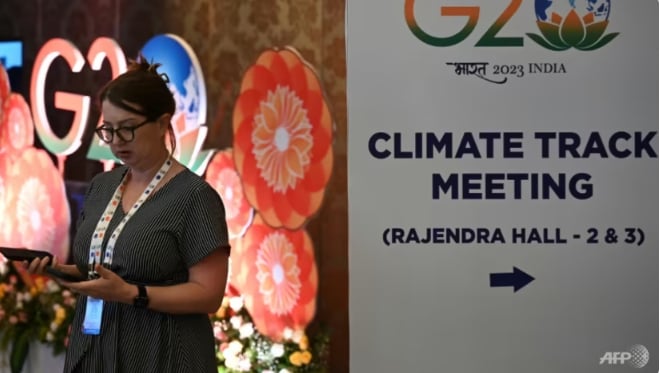June 21, 2025 | 03:07 GMT +7
June 21, 2025 | 03:07 GMT +7
Hotline: 0913.378.918
June 21, 2025 | 03:07 GMT +7
Hotline: 0913.378.918

Environment ministers from G20 nations meeting in India on Friday raced against time to reach a last-minute consensus on the most contentious issues to redress the global climate crisis. Photo: AFP/R.Satish BABU
No breakthrough was possible on several key points ahead of this year's COP28 climate talks, with negotiations also failing to reach a consensus on tripling renewable energy use.
"I am very disappointed," France's ecological transition minister Christophe Bechu told AFP after the meeting.
"We are not able to reach an agreement of increasing drastically renewable energies, we are not able to reach an agreement on phasing out or down fossil fuels, especially coal," he said.
"Records of temperatures, catastrophes, giant fires, and we are not able to reach an agreement on the peaking (of) emissions by 2025."
The discussions with China, Saudi Arabia, and on climate issues with Russia had been "complicated", he added.
India's climate change minister Bhupender Yadav, who chaired the meeting, admitted there had been "some issues about energy, and some target-oriented issues".
The Chennai meeting comes days after energy ministers from the bloc - which represents more than 80 per cent of global GDP and CO2 emissions - failed to agree in Goa on a roadmap to cut fossil fuels from the global energy mix.
That was seen as a blow to mitigation efforts even as climate experts blame record global temperatures for triggering floods, storms and heatwaves.
Major oil producers fear the impact of drastic mitigation on their economies, and Russia and Saudi Arabia were blamed for the lack of progress in Goa.
Campaigners were dismayed by the repeated failure to reach a deal on Friday.
"Europe and North Africa are burning, Asia is ravaged with floods yet G20 climate ministers have failed to agree on a shared direction to halt the climate crisis which is escalating day by day," said Alex Scott of climate change think-tank E3G.
Reports of Saudi and Chinese resistance, he added, "fly in the face of their claims of defending the interests of developing countries".
All present at Friday's conference understood "the severity of the crisis" facing the world, Adnan Amin, chief executive of this year's COP28 climate talks, told AFP.
"But I think there's a kind of political understanding that still needs to be achieved," he said.
"It's very clear that every country in the world will start by looking at its immediate self-interest," he added.
Most delegations were led by their environment and climate change ministers, while the US delegation was headed by Special Presidential Envoy for Climate John Kerry.
Also at the talks was Emirati oil boss Sultan Al Jaber, who will lead the upcoming COP28 talks in the United Arab Emirates starting in late November.
He has been heavily criticised for his apparent conflict of interest as head of the Abu Dhabi National Oil Company because burning fossil fuels is the main driver of global warming.
With raging wildfires in Greece and a heatwave in Italy, European Union environment commissioner Virginijus Sinkevicius said ahead of the gathering that there was "growing evidence on the ground of devastating climate impact" and "the livelihoods of people are being destroyed".
But progress in global negotiations has been slow, with the G20 polarised by Russia's war in Ukraine and sharp divisions on key issues.
Questions on financing the transition and ameliorating its short-term impacts have long been a point of contention between developing and wealthy nations.
Major developing countries such as India argue that legacy emitters need to spend more to underwrite global mitigation efforts in poorer nations.
"Whatever was pledged by the developed countries must be fulfilled," Yadav said after the meeting, which he added had reached consensus on other issues including land degradation and sustainable use of ocean resources.
(AFP)

(VAN) Poultry production in Poland, which has only started recovering from devastating bird flu outbreaks earlier this year, has been hit by a series of outbreaks of Newcastle disease, with the veterinary situation deteriorating rapidly.

(VAN) Extensive licensing requirements raise concerns about intellectual property theft.

(VAN) As of Friday, a salmonella outbreak linked to a California egg producer had sickened at least 79 people. Of the infected people, 21 hospitalizations were reported, U.S. health officials said.

(VAN) With the war ongoing, many Ukrainian farmers and rural farming families face limited access to their land due to mines and lack the financial resources to purchase needed agricultural inputs.

(VAN) Vikas Rambal has quietly built a $5 billion business empire in manufacturing, property and solar, and catapulted onto the Rich List.

(VAN) Available cropland now at less than five percent, according to latest geospatial assessment from FAO and UNOSAT.

(VAN) Alt Carbon has raised $12 million in a seed round as it plans to scale its carbon dioxide removal work in the South Asian nation.